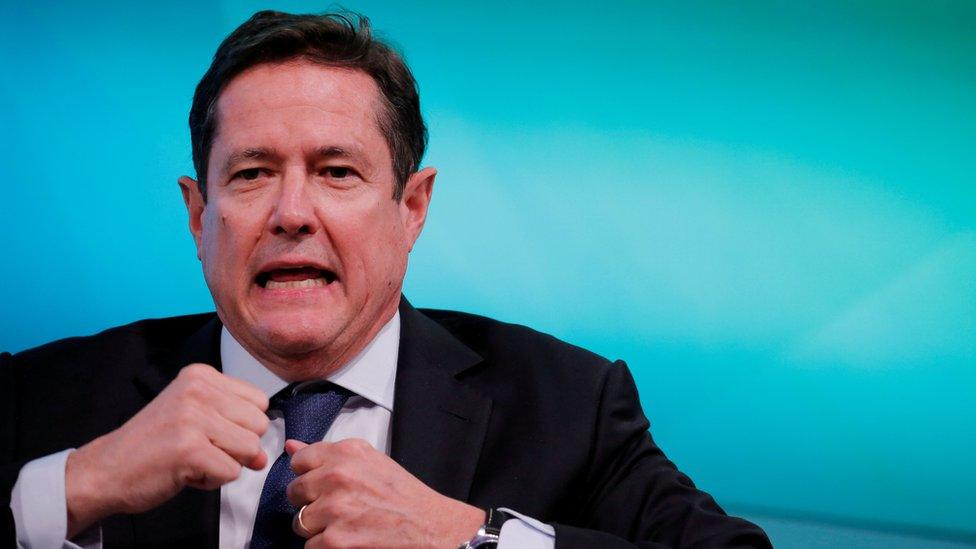Why you need to question your hippo boss
- Published

Is the hippo in your workforce too dominating?
As Richard sat in an important meeting at work, he and his colleagues nervously considered the hippo in the room.
Richard, who works for a TV production company in Toronto, was attending a key meeting to discuss future projects. And the hippo was dominating proceedings far too much.
Thankfully for the firm's health and safety considerations, there wasn't actually a large semi-aquatic mammal in the room with them.
Instead this "hippo" was an acronym for "the highest paid person's opinion", and the other attendees were too scared to question its wisdom.
"I can recall meetings where people are brainstorming, throwing around ideas, and ultimately going with what the boss came up with on a whim," says Richard, 34, who did not want us to use his surname.

Some bosses can be difficult to argue with
"You kind of see all the subordinates in the room glancing at each other defeated, [their faces] saying, 'are we really going ahead with this?'"
Most of us have had to work for an overly dominating hippo at some time in our careers - a boss who staff feel unable to criticise, or whose every idea employees feel they have to praise.
But how often is the unchallenged boss's decision correct? Far from all the time if a study, external by the Rotterdam School of Management is to be believed.
The report found that projects led by junior managers were more likely to be successful than those that had a senior boss in charge, because other employees felt far more able to voice their opinions and give critical feedback.
Balazs Szatmari, the lead author of the study, says: "The surprising thing in our findings is that high-status project leaders fail more often.
"I believe that this happens not despite the unconditional support they get, but actually because of it."

Balazs Szatmari says staff often feel unable to question their senior bosses
Mr Szatmari, who looked at 349 projects in the video games industry dating back to 1972, says that staff were likely to fear "the possible consequences of criticising the work of high-status employees".
Short of senior bosses not allowing themselves to do much at work, what is the solution?
Sarah Biggerstaff, a lecturer in leadership at Yale School of Management in Connecticut, says that companies simply have to work hard to allow staff to question their senior bosses' decisions without any fear of reprisal.
"It can be challenging to give feedback if there is a culture of fear around the office," she says.
"In that kind of organisation, if you don't go with the flow you won't get promoted. Or what's happened historically is that people pay lip service to executives instead of giving them constructive feedback in order to toe the line."

Sarah Biggerstaff says firms need to create a culture where senior bosses can be questioned
James Farrow, founding director of UK management consultancy Curium Solutions, agrees that senior managers should encourage staff to question their decisions and then "acknowledge the different perspective, and not leap... to disprove their viewpoint".
He adds that senior figures should "never ridicule or push back strongly in large groups, so that people feel safe voicing their views".
Brian Morgan, professor of entrepreneurship at Cardiff Metropolitan University, says there are numerous examples of bad business decisions that may have been prevented if senior bosses had been more willing to accept a collective approach to decision making.
"The recent whistleblowing controversy at UK bank Barclays has brought into sharp focus the importance of creating a corporate culture of openness, where employees feel confident to speak candidly about some of the issues facing the business," he says.
Prof Morgan adds that Royal Bank of Scotland's ill-fated decision to buy Dutch bank ABN Amro in 2007 for £50bn may also have been avoided if middle managers at RBS had been given more of a say.

Barclays boss Jes Staley was recently criticised for trying to uncover a whistleblower
US computer group Cisco Systems has had a formal feedback system, external in place for a number of years to prevent senior figures making decisions in isolation.
Cassandra Frangos, vice president for global executive talent and organisational development at Cisco, says that in one incident it was reported that an executive "was distant and defensive, and that he didn't partner on key business decisions".
"The feedback was instantly eye-opening for the executive," she says.
Mr Szatmari's suggested solution to the problem is for the leader of any new project to be kept secret, thereby encouraging junior managers to be more willing to put across their honest opinions.
He says such a "blind review process" would work best in a large business, and "offer an opportunity for leaders to learn from their staff, and to engage in the type of meaningful dialogue every company should have".
Back in Toronto, Richard says he remembers one project in particular that a former hippo pushed through.
"One idea, an animated, musical web series never really went anywhere commercially, and deep down it was what we all expected."